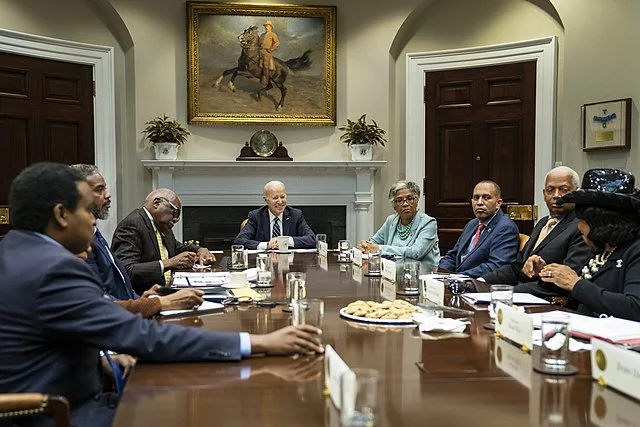
By
On Sept. 20, the Congressional Black Caucus (CBC) will have the chance to issue a call for economic justice. That’s when the 56-member body — two senators and 54 House members — will gather at the Walter E. Washington Convention Center to discuss the future of the Black community. The four-day event will be the last opportunity for national Black political leaders to forge an economic agenda for the 2024 elections.
Understand that the CBC is the primary organization for Black elected officials in the country. Over the years, its members have scaled the heights of power and influence in American government, most notably with the ascendance of Rep. Hakeem Jeffries (D-N.Y.) to House Minority Leader.
Yet, at a time of historic prominence, the leadership suffers from a deficit of ideas for accelerating Black economic development. It is a problem with roots in the unfinished work of the civil rights movement, and it is as urgent today as it was in the 1960s, according to historian Thomas Sugrue of the Economic Policy Institute.
The CBC conference will be chaired by Sen. Raphael Warnock (D-Ga.) and Rep. Stacey Plaskett (D-Virgin Islands), a non-voting delegate. If they can manage to bring attention to the need for a strong economic message, it would be in stark contrast to the earlier gatherings of civil rights leaders this summer.
In those cases, the focus was primarily on non-economic demands — many of which have been achieved already, in large measure. For example, at the NAACP convention in July, the message was about voting rights; likewise, for the March on Washington “against hate and for civil rights” in August.
So the ball is now in the court of the CBC, an organization with a history of divided intentions, led today by Rep. Steven Horsford (D-Nev.).
The CBC was founded in 1971 as the brainchild of Rep. Charles Diggs Jr. (D-Mich.), elected to the House in 1955. He joined Reps. William Dawson (D-Ill.), and Adam Clayton Powell (D-N.Y.) to form a delegation to represent the interests of the entire Black population of 22 million. Diggs proclaimed, “Our concerns and obligations as members of Congress do not stop at the boundaries of our districts; our concerns are national and international in scope.”
Other members, however, would balk at being defined as a vanguard force of the community. Instead, in 1972, they believed it more prudent to coalesce as individual representatives with the left wing of the Democratic Party. Since then, the CBC has suffered questions of identity and relevance, according to political scientist Kenny Whitby in “Dimensions of Representation and the Congressional Black Caucus.”
The Unfinished Quest for Black Economic Stability
Despite the impressive legislative achievements of the civil rights movement, the Black community continues to suffer from the unfinished quest for economic justice. Common indicators of material inequality include an enormous wealth gap, persistent wage gap, disproportionate levels of unemployment, low workforce participation, limited fields of occupation, and a half-century of stunted growth of the middle class, according to findings in The Unfinished March, a 2013 symposium by the Economic Policy Institute.
What passed for a modern Black economic strategy was, in fact, a short-term tactic to gain access to jobs in defense factories during World War II. It relied on the power of protest to rally for employment in segregated defense plants. The campaign was successful in tearing down racial barriers to factory employment — and became an instrument for expanding a fledgling Black middle class.
The overall improvement in the Black economic condition has been slow, even during times of economic expansion.
One outcome was increased employment in the public sector; another was accruing benefits from government transfer programs and income tax subsidies. Since the 1960s, the combination of factors has resulted in valuable benefits for many people.
Nonetheless, the overall improvement in the Black economic condition has been slow, even during times of economic expansion. Scholars have debated reasons for the inertia, including the effects of recessions, industrial disinvestment, private-sector discrimination, automation, immigration competition, rising levels of technical education, incarceration, and the dissolution of the two-parent family, among others.
How the CBC Can Foster a ‘Black Agenda’ for Economic Justice
The CBC conference is scheduled to discuss a range of economic issues, such as the emerging cannabis industry, business access to investment capital, and vending to the public and private sectors. But can it do more to spotlight ideas and spur activity toward an economic revival for the days ahead?
One, the CBC needs to explore ways to better participate in the vast industrial plan of the Biden administration. How can the Black community get a fair share of jobs and contracts under the Inflation Reduction Act and the $1.2 trillion Infrastructure Investment and Jobs Act? Understand that the federal government is poised to invest enormous sums in electric battery plants, electric vehicle factories, weatherization of public buildings, and reconstruction of highways, bridges, and tunnels.
Such projects will require training and hiring many thousands of skilled workers in manufacturing and construction. The CBC must consider an urgent campaign for inclusion in a construction industry that historically has excluded Black workers. According to the 2022 report of the Bureau of Labor Statistics, the racial demographic in the construction industry is 60% white, 30% Hispanic, and 5% Black American.
Two, the CBC appears to show little appreciation for the benefits of cooperative strategies. Yet, such practices have been used to good effect in the experience of the community, according to historian Jessica Gordon Nembhard in “Collective Courage: A History of African American Economic Thought and Practice.”
The conference could be a forum to explore new ideas that encourage cooperative thinking and formations at the community and state levels. Are there ways to better leverage social media and nodes of organization in the community — Historically Black Colleges and Universities, churches, professional organizations, social clubs — for the provision of affordable goods and services and employment?
Three, the CBC conference could examine the feasibility of encouraging strategic migration to four politically and economically promising Southern states — Maryland, Virginia, North Carolina, and Georgia. The strategy would nurture a zone of states with Black-led political coalitions under the constitutional framework of federalism.
Four, the CBC should consider ways to coordinate demands for reparations to build institutional wealth. Rather than demanding individual payouts, would it not make sense to direct payments to entities such as development funds and supplemental pension funds established in Black-owned banks?
Finally, the CBC must raise the alarm for workforce development, notably for a Black middle class at risk of displacement by automation. Now is the time to begin discussion about the need to retrain for the growing base of “middle-skill” jobs, according to “The Future of Work in Black America” by the McKinsey Institute for Black Economic Mobility. These are jobs that require more than a high school education but less than a four-year college degree and will be essential for American businesses to compete globally.
The CBC conference may be the last best hope for the political class to explore avenues for economic justice. If done correctly, it can place the call for a revival at the forefront of a “Black agenda” during the 2024 elections and beyond.
Roger House is associate professor of American Studies at Emerson College and the author of “Blue Smoke: The Recorded Journey of Big Bill Broonzy” and “South End Shout: Boston’s Forgotten Music Scene in the Jazz Age.” A version of the commentary was published in The Messenger.


